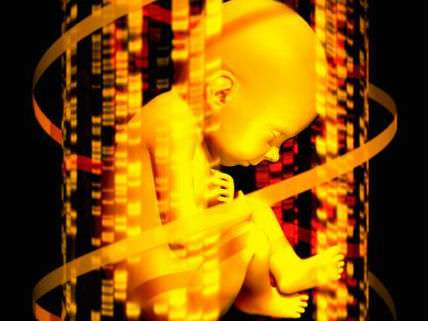Cheap Fast Powerful Gene-Editing Will Soon Change the World
Bioethicists are again trying to stand athwart progress, yelling stop

"The end of life as we know it." That's how the cover of Wired characterized CRISPR, the fantastically versatile and cheap new gene-editing technology. CRISPR works in bacteria as a kind of immune system that identifies and cuts up viral DNA when it tries to invade them. Researchers have now adapted it to edit genes and genomes virtually at will.
CRISPR can be used to edit crops and food animal genomes to improve their productivity and pest resistance. It can modify people's immune systems, letting them kill off cancer cells. It can construct micro-organisms that secrete carbon-neutral fuels. And it could let us curate wild environments by editing mosquitoes so that they cannot transmit disease and by causing invasive species to breed themselves into extinction. Two weeks ago, researchers at the Broad Institute in Cambridge, Massachusetts announced that they had developed an even simpler and more precise version of CRISPR.
The Wired piece promised that CRISPR will usher in a world where there is "no hunger, no pollution, no disease." Sounds perfectly terrible, doesn't it?
Critics worry that CRISPR will be used create "designer babies." In March, eighteen prominent scientists and bioethicists published an open letter in Science urging researchers to refrain for now from using CRISPR to modify human genomes. Nevertheless, Chinese scientists published research the next month in which they detailed their experiments using CRISPR to genetically modify triploid human embryos. (Such embryos could never have become babies.)
Now a British research group has applied for a license from the U.K.'s Human Fertilisation & Embryology Authority to use CRISPR to edit genes in human embryos. The leftwing bioconservative Center for Genetics and Society quickly condemned this proposal, calling it "a troubling and provocative move." In December the National Academy of Sciences will be convening a summit on human gene editing, especially addressing concerns about using CRISPR to make genetic changes that can be passed along to descendants. And in a new article for EMBO Reports, a group of bioethicists warns that there is "no time to waste" to confront "the ethical challenges created by CRISPR."
CRISPR does indeed pose ethical challenges. But these bioethicists oddly think that the Food and Drug Administration, the Environmental Protection Agency, the European Food Safety Administration, the European Medicines Agency, and similar bureaucracies are somehow qualified to resolve them. These agencies are so in thrall to the precautionary principle that they can barely bring themselves to approve any new technologies at all. For example, the FDA has refused to approve (or reject) salmon genetically enhanced to grow fast, fish its own scientists say are safe to eat and safe for the environment. No regulators anywhere have yet approved any genetically modified animals for human consumption.
Let's take a quick look at some of the risks that these bioethicists want to regulate. What about modifying heritable traits in the human genome—that is, creating "designer babies"? One common objection is that changing the genes in a human embryo is unethical because the fetus can't give its permission. Of course, not one person has ever given his or her permission to be born, much less to be born with genes that they bear. Designer babies are in exactly the same moral relation to the parents creating them as anyone else is. As the Oxford bioethicist Julian Savulescu has sensibly pointed out, failing to employ genetic engineering can "make a future child worse off than he or she would otherwise have been. Failing to develop and use genetic engineering techniques like CRISPR harms future children."
What about curating the wild? A gene drive works by making sure that both copies of a targeted natural gene in any sexually reproducing species are replaced with the engineered version. Thus researchers could genetically engineer mosquitoes to be immune to the malaria parasite; restore the effectiveness of a pesticide by eliminating resistance genes in weeds and insect pests; or alter genomes in a pesky invasive species so that it produces only males, thus causing it to go extinct. Researchers at the University of California, San Diego, have already used CRISPR to create gene drives in fruit flies as a proof of concept.
The EMBO Reports writers specifically cite the risks of releasing a gene drive that might cause the extinction of a mosquito species. Yet as the Harvard biologist George Church observed in New Scientist, even if a disease-carrying mosquito species did go extinct, "it's unlikely that it is going to kill any other animal. And every year we hesitate, 600,000 people die of malaria unnecessarily and another couple of million get sick and miss days at work. That's a pretty big price to pay."
The EMBO bioethicists also argue that there are several technologies that researchers and developers should adopt as part of any use of gene drives. For example, genetically modified creatures should be genetically tagged so that their spread in the wild can be tracked and, if something does go wrong, the creators can be held accountable. In addition, researchers should create gene drives that can reverse the effects of already released ones if it turns out to be desirable. Those are all sensible suggestions.
Too bad they aren't willing to stop there. Instead, the usual horde of would-be regulators is trying to stand athwart progress, yelling stop. The concept of permissionless innovation—the freedom to explore new technologies or entrepreneurial opportunities without seeking prior approval—is entirely alien to them. The more the precautionists manage to slow progress, the more people will continue to unnecessarily suffer from disease, debility, and death.


Show Comments (284)